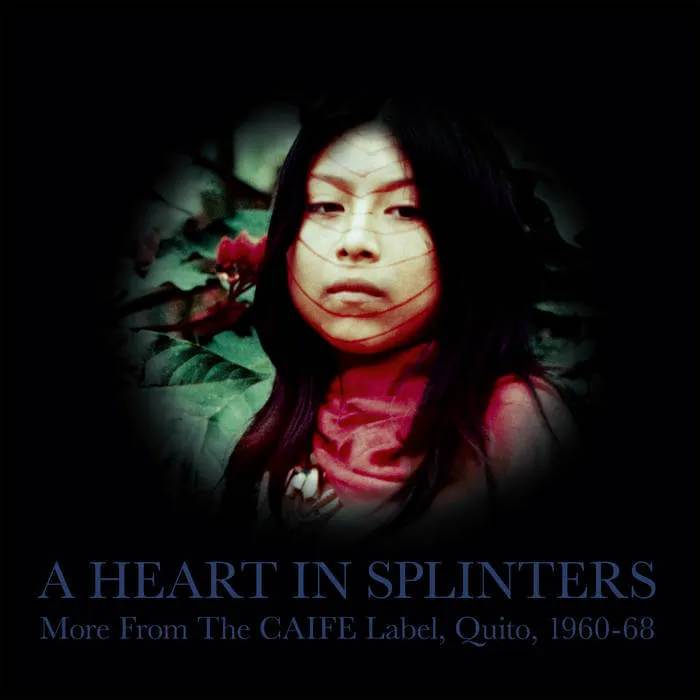- 2LP
- Recommended =
- New Release
Various
A Heart In Splinters: More From The CAIFE Label, Quito, 1960-68
Honest Jon's
- Cat No: HJRLP85
- updated:2022-03-15
HONEST JON'Sからエクアドルのムジカ・ナショナルの黄金時代の音楽を送り出すThe Caife Labelからのコンパイル。「A Heart In Splinters: More From The CAIFE Label, Quito」
Track List
-
A1. OLGA GUTIERREZ - A Veces He Pensado
-
A2. HERMANAS MENDOZA SUASTI - Alas De Sombra
-
A3. DUO BENITEZ VALENCIA - Amor En Tus Ojos
-
A4. CASPI SHUNGO - Mal Pago
-
A5. GLADYS VIERA - Así Se Goza
-
A6. ORQUESTA NACIONAL - Ponchito Al Hombro
-
B1. LIDA UQUILLAS - Vida De Mi Vida
-
B2. LOS IñAQUINGAS - Blanco Lirio
-
B3. SEGUNDO BAUTISTA - La Naranja
-
B4. DUO BENITEZ VALENCIA - Lindos Ojos
-
B5. LOS BARRIEROS - Siendo Triste Vivo Alegre
-
B6. SEGUNDO BAUTISTA - Soledad
-
C1. RAUL EMILIANI /HéCTOR BONILLA - Imploracion Indigena
-
C2. CASPI SHUNGO - Indio Soy
-
C3. DUO AGUAYO HUAYAMABE - Mi Ultima Ilusion
-
C4. CONJUNTO CAIFE - Huasipichay
-
C5. HERMANAS MENDOZA SUASTI - Para Ti
-
C6. OLGA GUTIERREZ - Despedida
-
C7. LUCHO MUñOZ - Lamparilla
-
D1. DUO HERMANOS VALENCIA - Corazón Mío (Cansados Pies)
-
D2. LUIS ALBERTO VALENCIA - Toro Barroso
-
D3. LOS BARRIEROS - Ashcu De Primo
-
D4. DUO AGUAYO HUAYAMABE - Panuelo De Penas
-
D5. HERMANAS MENDOZA SUASTI - Alma Enamorada
-
D6. DUO BENITEZ VALENCIA - Lamparilla
-
D7. ORQUESTA NACIONAL - Atahualpa
This time around, the woman steal the show. Laura and Mercedes Suasti were child stars, with an exclusive Radio Quito contract. Unlike nearly all the men here, they lived long and prospered: Mercedes died last year, at the age of 93. Gladys Viera and Olga Gutierrez both came to Ecuador from Argentina. To start, Gladys plugged the scandalous new Monokini swimwear; Olga performed for visiting British royalty in 1962. Olga was glamorous but tough. She would make little of the amputation of one of her legs: ‘I don’t sing with my leg.’ She is accompanied on our opener by quintessentially reeling, sultry musica national: haunted-house organ, twinkling xylophone, Guillermo Rodriguez’ heart-plucking guitar-playing, and lilting, dance-to-keep-from-crying double-bass. ‘Sometimes I think that you will leave me with no memories,’ she sings, ‘that you hold only disappointments in store for me… In the future your love will search me out, full of regret. By then it will be too late, there will be no consolation, only disappointment awaiting you.’
Other highlights include the two contributions of Orquesta Nacional: Ponchito Al Hombro, like an off-the-wall forerunner of the Love Unlimited Orchestra, beamed into the tropics from an unknowable time and space; and the tone poem Atahualpa, a mystical yumbo invoking Quito’s most ancient inhabitants, the Kichwa. Also the tremulous, gypsy-flavoured violin-playing of Raul Emiliani, who arrived in Quito from Italy, suffering PTSD from the Second World War; the inscrutable, sardonic experimentalism of organist Lucho Munoz; and the mooing and whistling of Toro Barroso — cow-thief school of Lee Perry — in which a muddy bull dashes home to his darling chola, fearless, full of desire.



